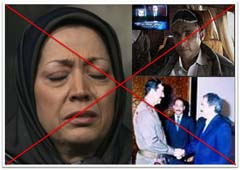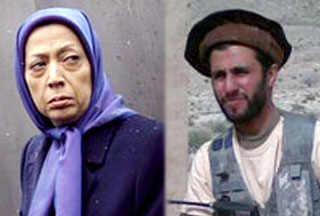The plots hatched by the anti-Iran terrorist Mojahedin-e Khalq Organization (MKO) for stationing troops alongside Iran’s eastern borders were defused after Tehran arrested Abdolmalek Rigi, the most notorious terrorist ringleader at its eastern borders, an Iranian lawmaker said Saturday.

"The MKO’s members were hopeful that after expulsion of the group from Iraq, they could establish a joint den of corruption in the eastern Iran in coordination with (Abdolmalek) Rigi, but this plot fell flat with the capture of Rigi," Mohammad Reza Khabbaz told FNA.
Last Tuesday, Iran announced that it has arrested Abdolmalek Rigi after intensive intelligence and security operations.
Rigi on June 2 admitted receiving assistance from the MKO, but relations between the two anti-Iran terrorist groups had surfaced a long time ago when US started plans to coordinate anti-Islamic Republic moves.
In August, the Jundollah terrorist group warned the Baghdad government that it would retaliate against the closure of a main camp of MKO by the Iraqi forces.
"…the Iraqi government should know that its hostile measures against the residents of Camp Ashraf who are Iranian immigrants in this city are not and will not be in the interest of the Iraqi government," Jundollah said in statement.
The MKO, whose main stronghold is in Iraq, has been in the country’s Diyala province since the 1980s.
Six years after toppling Saddam Hussein’s government in 2003, the country’s security forces took control of the training base of the MKO at Camp Ashraf – about 60km (37 miles) north of Baghdad and changed the name of the military center from Camp Ashraf to the Camp of New Iraq.
The Iraqi government and parliament have both voiced strong determination for expelling the group from the country.
The MKO started assassination of the citizens and officials after the revolution in a bid to take control of the newly established Islamic Republic. It killed several of Iran’s new leaders in the early years after the revolution, including the then President, Mohammad Ali Rajayee, Prime Minister, Mohammad Javad Bahonar and the Judiciary Chief, Mohammad Hossein Beheshti who were killed in bomb attacks by MKO members in 1981.
The MKO is behind a slew of assassinations and bombings inside Iran, a number of EU parliamentarians said in a recent letter in which they slammed a British court decision to remove the MKO from the British terror list. The EU officials also added that the group has no public support within Iran because of their role in helping Saddam Hussein in the Iraqi imposed war on Iran (1980-1988).
Many of the MKO members abandoned the terrorist organization while most of those still remaining in the camp are said to be willing to quit but are under pressure and torture not to do so.
A May 2005 Human Rights Watch report accused the MKO of running prison camps in Iraq and committing human rights violations.
According to the Human Rights Watch report, the outlawed group puts defectors under torture and jail terms.
The group fled to Iraq in 1986, where it was protected by Saddam Hussein and where it helped the Iraqi dictator suppress Shiite and Kurd uprisings in the country.
The terrorist group joined Saddam’s army during the Iraqi imposed war on Iran (1980-1988) and helped Saddam and killed thousands of Iranian civilians and soldiers during the US-backed Iraqi imposed war on Iran.
Since the 2003 US invasion of Iraq, the group, which now adheres to a pro-free-market philosophy, has been strongly backed by neo-conservatives in the United States, who also argue for the MKO to be taken off the US terror list.

